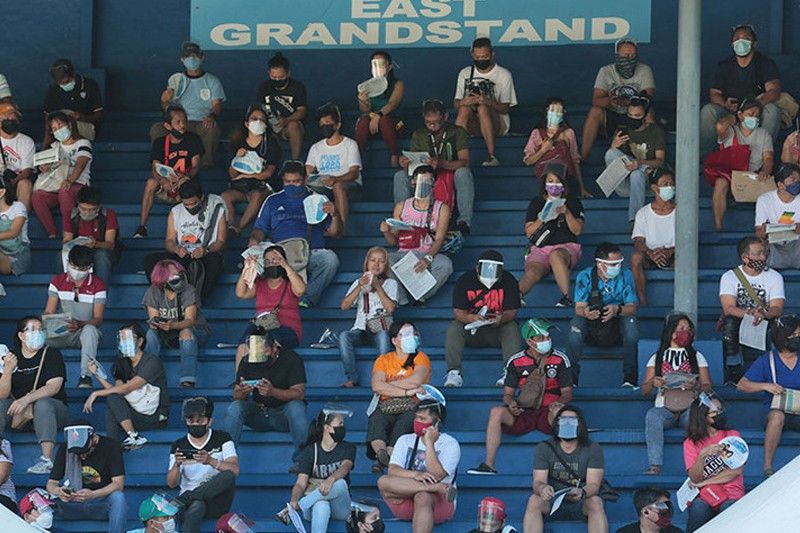IATF still discussing alert levels – Palace

MANILA, Philippines — Officials are still discussing the alert level to be enforced in Metro Manila, the pilot area for the government’s new quarantine strategy, Malacañang said yesterday.
The government was supposed to impose localized lockdowns in the National Capital Region (NCR) beginning Sept. 8 to restore jobs and to promote economic activity, but decided to postpone the enforcement of the new system for a week.
Metro Manila will remain under a stricter form of modified enhanced community quarantine (MECQ) until Sept. 15 to allow agencies to thresh out the details of granular lockdowns.
Last week, the Inter-Agency Task Force for the Management of Emerging Infectious Diseases (IATF) released “general directions” for the pilot implementation of alert levels system in Metro Manila.
However, there was no announcement yet as to what alert level would be implemented.
“That is being planned as we speak,” presidential spokesman Harry Roque said at a press briefing when asked about the status of Metro Manila.
“The IATF is holding a meeting about this as we speak. Let us just wait for the final decision. Once a decision is made, we will announce it immediately,” he added.
Roque said the national government is consulting with mayors with regard to the pilot implementation of the alert levels system.
“They (mayors) are the ones who will enforce this pilot and the decision will be based on the preference of our local government units (LGUs),” the Palace spokesman added.
The policy shift would provide local governments authority to act and implement actions consistent with their own risk assessments.
The pilot implementation seeks to determine if granular lockdowns can be equally effective with wide-scale community quarantine in terms of reducing COVID-19 transmission.
Under the new system, granular lockdowns would be imposed in specific areas with COVID-19 case clusters like houses and streets. For other areas, targeted restrictions consistent with their alert levels would be enforced.
The enhanced community quarantine (ECQ) will still be the most stringent classification while alert levels will govern activities in close, crowded and close contact areas and activities.
Under alert level 1, almost all sectors can operate but minimum public health standards should still be observed. For alert level 2, establishments can operate up to half of their capacity, while alert level 3 allows operational capacity up to 30 percent. High-risk activities will not be allowed under alert level 4.
‘Good idea’
Presidential adviser for entrepreneurship and Go Negosyo founder Joey Concepcion has reiterated his preference for granular lockdown over community quarantine.
“The shift to implementation of granular lockdowns is a good idea instead of implementing wide-scale lockdowns. There is a sufficient level of vaccinated individuals in Metro Manila and I think it is already appropriate,” Concepcion said during a town hall meeting with Metropolitan Manila Development Authority (MMDA) Chairman Benhur Abalos and other officials and members of the business community yesterday.
“Patience is running out. People are losing their cool. There is a lot of tension and we can’t blame all of these people because we really have to find a solution to coexist with COVID-19. If we are unable to find that solution, I don’t think the government can continue funding massive amounts on all of these medical expenses from testing to tracing to vaccination, the ayudas and the list goes on,” he said.
To fund the expenses, he said the government has to earn revenues, which will come from taxpayers such as the private sector and their employees.
“Without economic activity, saving lives is definitely not sustainable,” he said.
For his part, Abalos expressed support for Concepcion’s proposal to ease restrictions for fully vaccinated individuals in Metro Manila.
“We are one with Mr. Concepcion for lessening the restrictions that are still subject of study of scientific data,” he said.
He said it might also be good to revisit current standards that are being used to reclassify community quarantine restrictions. “We have to find other factors to help us decide,” he added.
Review parameters
Abalos said Metro Manila mayors want the national government to review its parameters for determining the extent of granular lockdown.
In particular, the mayors appealed to the IATF to reconsider including the rate of admissions at COVID-19 hospitals in determining which areas would be subject to lockdown.
“If we are going to make use of the hospital care utilization rate, it will be unfair to some local government units,” he said.
He cited as an example San Juan City, which has exceeded its target of COVID-19 vaccinations but has hospital admissions rate at over 80 percent as of Saturday – mostly comprising non-residents.
“If we follow this, San Juan will always be closed, they cannot move economically,” he pointed out.
“We are telling the technical working group to reassess this… (Hospital care utilization rate) could be one of the factors, but try other factors or otherwise the LGUs might be affected,” he said.
Former vice president Jejomar Binay objected to the timing of the imposition of the alert-based granular lockdown system.
“We are experiencing a surge and experts say the proper strategy is to contain the virus, which means restricting movements for a certain period. The granular lockdown experiment is not only counter-intuitive. It defies common sense,” Binay said in a statement yesterday.
He also said it’s “unfair” for the national government to delegate obligations to the LGUs.
“The national government is not only passing the burden of containing the spread of the virus and providing ayuda to their constituents to the LGUs. By making the LGUs take the lead, the national government can now wash its hands of any blame for possible lapses or missteps,” he said.
More certainty
Two House officials, meanwhile, called on the national government to provide “more certainty” in imposing lockdowns.
“Investments will continue to expand as quarantines become more certain. The moment our quarantine regime becomes more predictable, you’ll see more interest in the Philippines,” Rep. Joey Salceda said.
“The future is still very bright for the country, but there’s plenty of business uncertainty, because our quarantine regime is still very fluid,” Salceda, chairman of the ways and means committee, said.
He said he is recommending a “simplification of quarantine regimes and a codification of triggers to help businessmen predict whether a lockdown is upcoming.”
“Let’s stop this shotgun approach under a widespread or extensive lockdown. Our approach should be more surgical this time around, which is why we should only choose specific areas where we should implement a lockdown,” House Deputy Minority Leader Stella Quimbo, for her part, said.
“The growth of our economy has been hampered or stunted for too long already,” she said.
Quimbo pointed out there was no need to revert to MECQ for Metro Manila, as practically all industries were amenable to the proposed granular lockdowns.
“If we already have millions who have been inoculated and we strictly enforce the minimum health standards, then let’s just open up the economy and allow ordinary Filipinos to go back to work,” she said.
“Let us allow our businesses or workplaces to operate for as long as these businesses are COVID-safe, which means there have been regular testing, social distancing and 70 percent of their employees have been vaccinated,” Quimbo added.
Senate President Vicente Sotto III, meanwhile, has appealed to the IATF to reconsider the prohibition on religious gatherings, saying people also need to take care of their spiritual well-being.
“Religious services and activities help the people by providing a spiritual support system, helping in the reduction of psychological stress and promoting good mental health during this time of pandemic. It is important for our government to take care of it as well,” Sotto said. – Louella Desiderio, Delon Porcalla, Ghio Ong, Cecille Suerte Felipe
- Latest
- Trending































